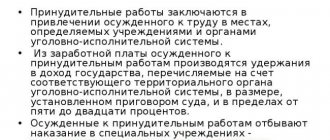Judicial power is one of the forms of expression of the will of the state, implemented through the mechanism of justice. Despite the fact that it is aimed at protecting and restoring the legal rights, freedoms and interests of subjects of legal relations, in some situations the court itself needs legal protection. One of the most dangerous acts aimed at harming the authority, honor and dignity of the judiciary is contempt of court.
Next, we will consider in which normative legal acts contempt of court is indicated as a crime, as well as the consequences that occur with this offense.
Legislative support
According to Article 297 of the Criminal Code of the Russian Federation (hereinafter referred to as the Criminal Code of the Russian Federation), insulting participants in court proceedings, a judge, a juror and other persons is contempt of court, for which the perpetrator is subject to criminal liability.
The emergence of such a norm provided certain guarantees for the protection of the interests of justice, because its effectiveness depends not only on the implementation of the norms by the court itself, but also on how other entities interact with it.
Contempt of court creates an unfavorable environment that interferes with the administration of justice and does not allow the circumstances to be examined fully and comprehensively. In addition, insulting participants in legal proceedings is seen as targeted interference; this is a unique way of putting pressure on the judge to make it difficult to make a decision on a case or to induce him to change his position.
What is contempt of court?
Insult is usually understood as derogation of the honor and dignity of another person, expressed in an indecent form. This is an evaluative formulation that provides grounds for broadly interpreting the category in relation to each specific case, taking into account all the circumstances.
As a result of judicial interpretation and clarification by courts of various instances, behavior is considered from the perspective of the possibility of humiliating, causing moral suffering, and having a negative impact on the course of legal proceedings.
As already mentioned, insult manifests itself in the humiliation and indecent form of its expression. Humiliation is understood as the public announcement of the negative qualities (characteristics) of a person, undermining his authority and respect from others.
You can humiliate someone both in personal communication and in the presence of other people. Written, oral forms, humiliation through gestures and facial expressions are allowed. Of particular importance is the indecency of the form, expressed in the use of cynical, obscene, rude gestures and expressions.
Thus, contempt of court can be expressed in a variety of forms, but all of them are assessed from the position of morality and ethics of society, the inherent level of behavior and culture.
What criminal penalties can be applied?
The main article under which a person who has insulted a judge, jurors and other participants in the trial can be held criminally liable is Article 297 of the Criminal Code of the Russian Federation. It has two parts:
- Under the second part, persons who have insulted judges and jurors are prosecuted.
- In the first part - for insulting other participants in the process.
Insult is understood as any action the purpose of which is to humiliate the honor and dignity of persons.
Note! To attract attention to this article, humiliation must be voiced in a harsh form, which is contrary to all stable morals and behavior in society.
Disrespect can be expressed verbally, or in actions that do not have health consequences (slapping or spitting).
Persons may also be held criminally liable under another article, number 319 of the Criminal Code of the Russian Federation. It involves correctional labor for up to one year.
The assignment of a particular article here is related to the place where the crime was committed. If the insult took place in a courtroom or in another courtroom, then article number 297 of the Criminal Code of the Russian Federation is assigned.
If the humiliation occurred in another place, then such acts are classified under Article 319 of the Criminal Code of the Russian Federation.
Corpus delicti
Analyzing the content of Art. 297 of the Criminal Code with comments to it, the direct object of contempt of court is the authority of the court and the correctness of legal proceedings, and the dignity of the participants (parties) in the proceedings is an additional object. Since the object of a crime always reflects a public danger, it is worth noting that contempt of court negatively affects the implementation of the principle of equality of rights in relation to evidence, diminishes the authority of the court, and has a disorganizing effect.
The objective side of Art. 297 of the Criminal Code of the Russian Federation consists of insulting the participants in the process specified in the article. Please note that due to the special status of participants in legal proceedings, some insults are regarded differently if they were applied to other persons (for example, the words “moron”, “idiot”, etc.).
It has also been established by judicial practice that if during the same process various participants were repeatedly subjected to insults over a short period of time, then this is qualified as one crime.
However, if the temporary gaps were long, for example, when the trial of the case was postponed and postponed for several days, then such actions are regarded as three independent acts (Resolution of the Presidium of the Armed Forces of the Russian Federation dated May 21, 2008 No. 120-P08).
Note. When determining whether a person’s behavior is offensive to the court, the latter must correctly distinguish them from other actions also related to contempt of court, but not aimed at insulting the participants in the process (failure to appear when summoned, etc.). In such cases, the guilty person is brought to administrative responsibility in accordance with Article 5.61 of the Code of Administrative Offenses (hereinafter referred to as the Code of Administrative Offenses of the Russian Federation) in the form of a fine for contempt of court.
The subject is characterized by the following characteristics:
- Sanity is the ability of a person to realize the actual nature of the actions being carried out, to assess the social danger of the consequences;
- reaching the age of 16 years.
The subjective side is expressed in the presence of exceptional direct intent, when the guilty person is aware of the social danger of his actions, wants to commit them and achieve a negative result.
Qualifying features
The qualifying feature of Article 297 of the Criminal Code of the Russian Federation is insult to a judge, juror or other person involved in the administration of justice, that is, officials directly involved in legal proceedings. Verdict under Part 2 of Art. 297 of the Criminal Code of the Russian Federation is a more stringent measure of criminal liability.
Jurisdiction
By virtue of direct instructions of the law, the crime provided for in Art. 297 of the Criminal Code of the Russian Federation, has jurisdiction over district courts of general jurisdiction. Claims are filed in accordance with the general procedure.
On the unconditional need to show respect for the Court... By everyone
This article was born out of the need to somehow clear the marginal status imposed on me and, at the same time, show that a literate and educated person (do not confuse the term “education” with education) can be quite legally savvy and understand no worse than a professional that the Russian justice in its highest understanding is the very Russian national idea that is so unsuccessfully sought. Because Justice in translation means Justice. But, unfortunately, only in translation, and only ideally. Machiavelli also said that people make mistakes, but the people never make mistakes. As a representative of the people, who, however, does not seek to “represent” them, I will speak. Fortunately, I have some experience for this.
Should the Court be respected? Without any doubt! The court is not just a government body, based on the Constitution of Russia and any other country, the Court is also the most important self-regulator of society. The society delegated to its representatives the legislative functions of creating Laws acceptable to the given society, and to the court the right to resolve existing disputes in the manner prescribed by the Law.
Everyone, regardless of upbringing and basic knowledge, eventually comes to the conclusion that the Court is something designed to dispense Justice. If so, then the Court must be respected!
But let’s see what the Court is based on the Laws of our country and our rich experience. Is the Special Troika of the NKVD of the USSR a court? No! This is a purely punitive body in which this “extrajudicial court” “considered cases” consisting of the head of the regional NKVD, the secretary of the regional committee and the regional prosecutor. There was neither the defense nor the accused in the “process” - there was only one “investigation” presiding in the “court”, “accusation” as the right-hand side and “class expediency” instead of the left. Although there was a semblance of legality - the order establishing “troikas” was signed by a member of the government, People’s Commissar of Internal Affairs Yezhov, and approved by the Politburo of the Central Committee of the All-Union Communist Party of Bolsheviks. After the Special Troikas, there was a Special Meeting under the NKVD of the USSR , the same extrajudicial, but apparently legal body. Finally, we came to the conclusion that there is no need to reinvent the “bicycle” and that there are well-proven legal systems in the world that are suitable for us. The USSR, for better or worse, returned to the legal field of the Romano-Germanic legal family.
Is it good? In my opinion - wonderful! I am a supporter of Roman law, although I give due respect to Anglo-Saxon law. Again, in our country it is accepted, the Mediterranean. So let it be. For me, as an uneducated representative “from the plow”, everything is clear: there is a Law, whether it is good or bad, but Dura Lex, sed Lex - it must be fulfilled, and it must be fulfilled by everyone and strictly! In fact, once we come to such a wonderful conclusion, everything falls into place. Separation of powers! Citizens choose the legislative branch from their best representatives and, ideally, the “legislative” - that is, the executive and law-enforcement - that is, the judicial. At the same time, we, in Russia, have a wonderful body within the judicial system - the “legislative interpretative” body, also known as the Constitutional Court.
All! Satisfied citizens clap their hands and go home happy! Happiness has arrived in the country! Society self-regulates through constitutional methods, through general elections and an independent judiciary. If someone misunderstands that the Rights and Freedoms of a Person and a Citizen end where the Rights and Freedoms of Another Person and a Citizen begin, our most humane Court in the world clarifies and eliminates the existing contradictions.
I believe, for example, that citizen Pupkin interferes with me and society. Based on this understanding of mine, I take a rifle and blow Citizen Pupkin’s brains out. And citizen Pupkin himself, one must think, believed the opposite, but I cocked the hammer and pulled the trigger earlier. Our wonderful Court establishes the truth and admits that I killed Pupkin in time because I acted in self-defense or, on the contrary, I cold-bloodedly planned and destroyed a useful member of society. In one case, everyone, including me, goes home; in the second, my home for many years will be a prison cell and a camp barracks. But since we live in a rule of law state (Part 1 of Article 1 of the Constitution of the Russian Federation) and everyone is equal before the law and the court (Part 1 of Article 19 of the Constitution of the Russian Federation), the Court in this case will be represented by: On behalf of the victim and the state - the prosecutor , on behalf of me - I myself and my defender, and His Honor, the Honorable Judge Sutkin, will preside over the trial. The prosecution will prove one thing, the defense will not prove anything - it does not need this according to its status, and it will bring to the attention of His Honor how much the prosecutor, as an equal Party to the Defense, is wrong, not consistent and how much his arguments are not based on Law. If His Honor, the Honorable Judge Sutkin correctly grasped the essence, if his opinion expressed in the lines of the sentence he delivered is based on the correct application of the Law, then he will pronounce a reasoned, justified and legal sentence, which no one can challenge either in the second instance or in supervision , nor in the ECHR!
This is how we, little by little, came to the main thing! To Respect for the Court, aka, Respect for Court!
If we read somewhere that a certain individual said literally the following: “the court is the standard of imbecility or criminal neglect of the Laws ,” what will we say about him? Only one thing - this was said by a man who is definitely sick in the head! Even in prisons and camps, even the most negative ones, with a compass rose on their knees and a twisted SS shoulder strap on their shoulders, will never say this. The “deniers” deny everything, but in order: the “cops” - employees of the Federal Penitentiary Service and the police, prosecutors, any government authority, women, family. In their “hierarchy”, disrespect for the court as such is so far away that it is not voiced. A “decent thief” exists in order to be imprisoned, he goes free to return, and it is the judge who returns him. Therefore, “according to concepts”, murder is not good, it is a sin. But killing a “cop” or a prosecutor is valor (if it does not harm the “common” - in that philosophy, I’m not strong, much less you). But the murder of a judge will be followed by a cruel “demand” - a kind of “trial by concept.” However, stealing from a judge is aerobatics and the story of such theft will forever go down in prison folklore.
So, the one who said this is not friendly with his head, accordingly, all his subsequent “conclusions” are the delusions of the poor fellow, who has no intelligence at all!
What if the phrase was originally different?! But what if in the original source it looked like this: “Personal observation is this: if I always and everywhere said that the Amur Regional Court is the standard of imbecility or criminal neglect of the Laws, now I think that the Krasnodar Regional Court is far in the competition for “throwing dwarfs at a distance” surpassed him . And if, on top of everything else, the entry was preceded by a question to the legal community with approximately the following content: “Gentlemen! How can we understand a high court, some of whose members are also legal scholars, if they, in violation of all and every procedural norm, do not retire to the deliberation room, do not make rulings on the challenge requested by them and the prosecutor, and conduct the “trial” like the ever-memorable “troika” NKVD”, and not as a Court in a State of Law. Is this theatrical performance a trial?”
Logic dictates that in this case, a certain dumbfounded citizen of a country that declares its navigation in the legal space of the Romano-Germanic legal family asks his, perhaps more literate colleagues, what to do in such a situation? From a more detailed and thought-formed quotation it follows that this citizen has an idea of a specific Amur Regional Court , which, in his (may well become authoritative) opinion, is a standard of imbecility or criminal neglect of the laws. But, again, in his private opinion, the Krasnodar Regional Court when checked by the International Chamber of Legal Weights and Measures , if such a thing existed, would be more justifiably accepted as such a standard. And then this “dishonest citizen” gives more than specific examples.
Let's make a lyrical digression. It is common knowledge that that unreasonable citizen is me. It is generally clear that we are talking about a court, which was represented by the deputy chairman of the court, Doctor of Law. Professor, Nikolaychuk Igor Anatolyevich, Chairman of the Board for Criminal Cases, Ph.D. Zagudaev Yuri Nikolaevich, and experienced judge Kolesnikov Nikolai Vasilievich. A large legal community, including those following the case of Judge Novikov, understand that the Krasnodar Regional Court has driven itself into a framework from which it is difficult for it to escape - here, naturally, we are not talking about the framework of the Law. It is generally clear that there is a certain “undercurrent” as a result of which the “process” takes place not only within the framework of the criminal Process itself (the capital letter is given in advance), but outside the framework of the Judicial Process, before and after it, although, however, in the same, largest in Europe building occupied by the court.
Thus, another legal scientist is the “undercurrent” - Chairman of the Investigative Committee of the Russian Federation, Colonel General of Justice, Doctor of Law, Professor Alexander Ivanovich Bastrykin . The Krasnodar Regional Court, representing de facto itself in the “court” (in the absence of a procedural legal process, I insist on putting the concept in quotation marks), put itself before a choice: either make a legal determination, taking into account the presented and examined evidence, or an illegal one , but one that will please the professor who was appointed to the position by an assistant professor who loves badminton, iPod and Twitter. For the “court”, any option was clearly a loser and the “court” made a determination that a friend of a badminton, iPod and Twitter lover might like. But…
Let's return to legal families. The Code of Criminal Procedure of the Russian Federation, although in a truncated form, included a certain rudiment of Anglo-Saxon legal culture . Based on Part 4 of Art. 29 of the Code of Criminal Procedure of the Russian Federation the court has the right to make a private ruling, and on the basis of Art. 7 of the Code of Criminal Procedure of the Russian Federation, having seen a conflict of law, it may generally suspend consideration of the case until the Constitutional Court gives an opinion on the Law to be applied in this particular case.
First, Nikitenko’s defense attorney, declaring that his client is abdicating the obligations he voluntarily assumed to comply with the undertaking not to leave the place, points out some discrepancies and uncertainty in the national criminal procedural legislation and offers the court a wonderful solution - to suspend the proceedings in the case pending consideration the constitutionality of the Laws to be applied in this case in the Constitutional Court. Then he challenges the prosecutor , in which he again points out a certain legal conflict that, in his opinion, contradicts the only law of Direct Action, including in the Basic Law itself (the definition is outdated, but correct). It is clear to the naked eye that a delay in making a decision is as useful to the “court” as, in the opinion of the investigators, it is to the defense. Again, there is a Law that once and for all, until its repeal, establishes that, on the basis of Articles 7, 65, 66 and 256 of the Code of Criminal Procedure of the Russian Federation, the requested challenge is considered by the Court after ascertaining the opinion of the Parties with removal to the deliberation room. If the “court”, showing disrespect, and after the Party specifically pointed out the need for strict adherence to procedural norms, and contempt for the Law, left the stated notice without attention, and the stated challenge without consideration, is such a “court” a Court in the highest sense of this words? In my opinion no. Forgive me my impudence - I may be a legal nihilist and a legal mediocrity.
But next, with the most beautiful and exceptionally competent, based on the case materials and the norms of the Law, comes a legal genius - lawyer Sergei Aleksandrovich Gurov, who again points out a global legal conflict , which, although it is permissible to consider the present composition of the court, but, in the interests of the entire judicial community of the Russian Federation, it is more useful to send it to the body of constitutional judicial control for clarification of the rules of law enforcement.
At the same time, and it is not for nothing that we return again and again to the “filthy Anglo-Saxons ,” the said “court,” which, again, in my nihilistic non-legal opinion, did not show itself to be such, could, on the basis of the same part of Art. 4. 29 of the Code of Criminal Procedure of the Russian Federation to make a particular determination that “if it is impossible, but you really want to, then you can!” . For greater effect, you can add some helpful Latin! Dominus et deus noster sic fueri iubet - so commands our lord and god! That is, if not a single argument of the prosecution demanding that judge Dmitry Vladimirovich Novikov be closed once again in the pre-trial detention center has not found its objective confirmation in the Court, but the “court” cannot go against the request of such a person as the chairman, professor, doctor of sciences and, moreover, is a friend of the Guarantor Himself, then YOU CAN FOLLOW the Leading and Directing Role. Whose role must, of course, be invented... And here’s what’s remarkable: when issuing this kind of determination, not based on the Law, but motivated and justified by the Leading and Guiding Role, the Presidium of the Supreme Court at the next generalization of judicial and “judicial” practice (another rudiment of the “filthy Anglo-Saxon") it will not be difficult to invent a by-law, which will certainly later acquire the force of law.
In this case, fools can say that ignorance of the laws does not exempt from responsibility, but smart people will know for sure: “suitcase-station-Europe” is better for health than “duffel-carriage-native snow-covered expanses because of thorns” and unnecessary They will have no illusions about the Law of Justice.
Since my virtual opponent complained that I was “a jackal behind my back,” and the volume of the article had already exceeded the readable size, the rest, from my own experience, which is not related to this description, will be included in the second part.
But for the sake of formality, let us summarize: a court cannot be considered a Court and demand respect for itself if it does not follow what was established by the legislator, i.e. The people, procedural norms. If the process proceeds outside the prescribed legal procedures, such a process cannot be called a judicial process, and the judge or composition of the court cannot be called a Court.
Court is not a theater! There is no scriptwriter or director in it . There is a Spectator, wise by experience and armed with the Law, the Presiding Officer. If the “performance” is particularly interesting, then the Spectators can be up to 13 people, plus the gallery (President, 12 main and alternate Jurors). But without Actors and Executors - Parties to the Case, the Court cannot exist! Even if we have a “one-man show,” there is always the other Side and the Law. But if someone donning the mantle of the Spectator does not understand the Laws of the genre, he is subject to booing. And what can we do about public booing - after all, our court, with extremely rare exceptions, is open! And only for the Main Spectator, who is in a robe, what is happening on stage is the Court, for him the Parties “play”. But if for the public this is all a Theater performance, then that’s ce la vie! Today, here you are, and tomorrow, here you are! If the "Tribune" or the "Emperor" himself does not respect the plebs... victory will still be for the plebs. Krasnodar. To be continued
Difficulties of proof
Unfortunately, in the practice of courts when passing sentences under Article 297 of the Criminal Code of the Russian Federation, many problems arise related to the evidence base. Often, a judge, faced with insults from participants in the process, deliberately ignores and does not initiate proceedings, since this requires a considerable amount of time and leads to a delay in the consideration of the case.
Also, the function of ensuring order is assigned to bailiffs, but often they do not have the necessary level of legal culture and do not know what to do in such situations due to insufficient methodological training.
Another difficulty is the involvement of linguist experts who can conduct a high-quality linguistic examination and determine whether an insult occurred. A special role is played by the lack of necessary specialists in many expert centers, and even if they are on staff, they rarely have the necessary competence and qualifications and are not able to objectively evaluate statements.
It is also possible to prove the fact of insult using the protocol of a court hearing, however, even here the legislative position is not entirely clear. According to the definition of the Judicial Collegium for Criminal Cases, the use of profanity in procedural documents, which includes the minutes of the court hearing, is unacceptable.
The way out of this situation is to replace it with words in an acceptable form, as well as replace individual letters of a part of a word with ellipses to convey the general meaning of the statement.
It is obvious that in such a crime the ethical role of the judge is extremely high. According to the European Court of Human Rights, the activity of a judge is subject to the principle of restraint, which does not allow him to fully respond to what is happening. In addition, it is necessary to find out to what extent the insults interfered with the judicial process and prevented the judge from making a fair and independent decision.
Contempt of court in other normative legal acts
In addition to the Code of Criminal Procedure of the Russian Federation, contempt of court is an offense according to the norms of the Arbitration Procedure Code of the Russian Federation, the Code of Civil Procedure and the Code of Administrative Offenses of the Russian Federation.
As already stated above, insult in accordance with Art. 5.61 of the Code of Administrative Offenses of the Russian Federation is punishable by a fine, and according to Art. 17.3 of the Code of Administrative Offenses of the Russian Federation, contempt of court and improper performance of duties, expressed in failure to comply with the order of a judge or bailiff to ensure the established procedure for the activities of courts, also entails a fine or administrative arrest.
Here it is worth paying attention to the meaning of Art. 17.3, since it includes not only insult as a factor that violates the established procedure of legal proceedings, but also other illegal actions. For example, under this article a lawyer is held accountable for contempt of court.
In the arbitration process, liability in the form of a court fine for disrespect is established by Part 5 of Art. 119 of the Arbitration Procedure Code of the Russian Federation, if in a particular case a person is not subject to criminal liability.
In civil proceedings in Art. 159 of the Code of Civil Procedure of the Russian Federation reveals in sufficient detail the procedure for implementing measures applied to violators of the order: first a warning is announced, in case of repeated violation, removal from the courtroom is allowed on the basis of a ruling, then the guilty person is subject to a fine.
Measures for insulting a judge
For insulting a judge, a person is brought to criminal liability under article number 297, part 2 of the Criminal Code of the Russian Federation:
- Or a fine of up to 200,000 rubles (or in the amount of the wages of the guilty person for up to one and a half years).
- Or compulsory work up to 480 hours.
- Or correctional labor for up to two years.
- Or arrest for up to six months.
Important! The elements of this crime must be distinguished from the crime under article number 298, part 1. It indicates the responsibility of a person for defamation of a judge or other officials.
Arbitrage practice
Claims for contempt of court constitute an extremely small percentage of the total number of cases considered by the courts. The most “bright” cases are:
- Resolution of the Ulagansky District Court (Altai Republic) dated December 25, 2014 No. 5-711/2014 (link to this act),
- Ruling of the Supreme Court of the Russian Federation dated September 14, 2011 No. 16-011-45 (link),
- Appeal ruling of the Supreme Court of the Russian Federation dated April 18, 2013 No. 43-APU13-1 (another link to the court decision).
In these cases, the courts concluded that illegal actions against other persons who do not have the status of a judge also violate the procedure established by law for the administration of justice, create an atmosphere of nervousness in the courtroom and undermine the authority of the judge.
Practice also indicates that insults expressed when using video conferencing systems are also taken into account , that is, it does not matter in what form the disrespect was expressed.










